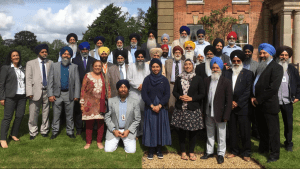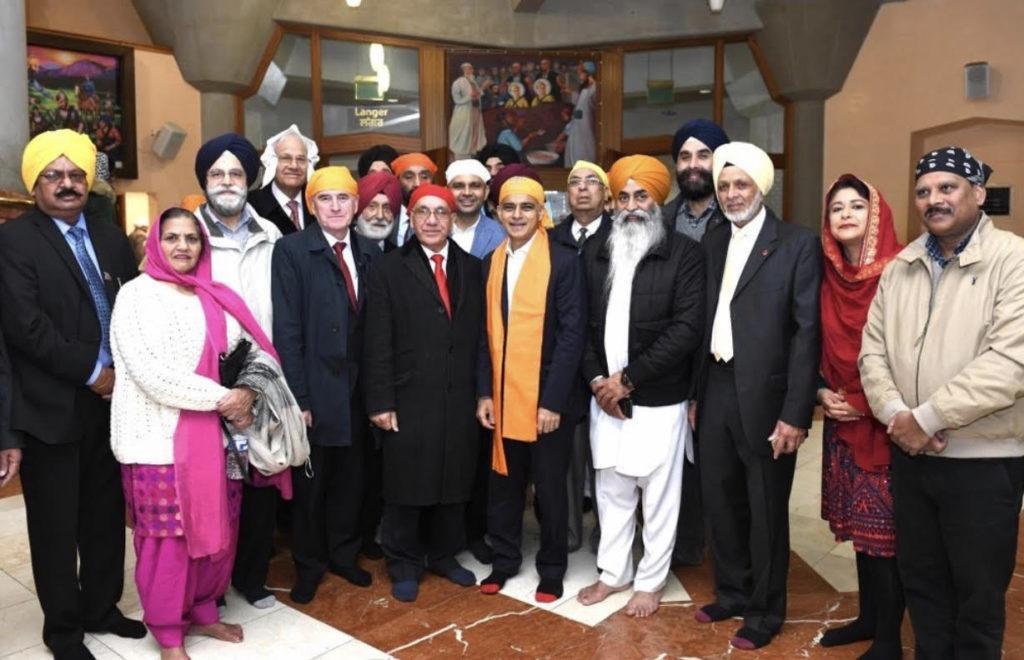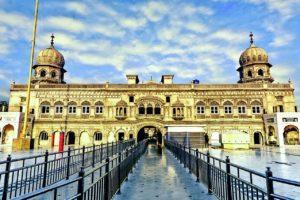
This advice is primarily for the 130 NSO gurdwaras and other affiliated Sikh organisations. Please feel free to share it with other gurdwaras and groups.
Around 17th March 2020 many places of worship including churches, mosques and synagogues made the difficult decision to restrict or hold back services due to the Covid-19 pandemic. This followed direction from the Church of England (CoE), the Muslim Council of Britain, and the Office of the Chief Rabbi. The CoE recommended live stream sermons as an alternative to worship in church. At the same time, the Network of Sikh Organisations (NSO) gave advice along similar lines to gurdwaras we collaborate with. On 20th of March we announced:
‘Many gurdwaras have already taken steps to curtail or completely stop services. Although it’s not an easy decision to make, following discussion with medical professionals some of whom are at the frontline of tackling the disease, we have concluded UK gurdwaras should seriously consider temporary closure of normal gatherings to prevent transmission of Covid-19.’
We followed this up with telephone calls to individual gurdwaras and management committee members.
Filling the gap caused by the temporary closure of gurdwaras
Our gurdwaras provide two main functions:
1. Congregational prayer or prayer in the sangat, which enhances individual prayer.
2. Strengthening Sikh community cohesion and a commitment to service, through langar (free kitchen) and social activities. The Covid-19 pandemic should be seen as a ‘chardi kala’ (high spirits) opportunity by Sikhs, to look afresh at the teachings of out Gurus, individually and within the family, and to reflect on how these can help us in our journey through life. The internet can help us through the establishment of a virtual congregation. Sikh women’s groups have already taken a lead through the establishment of Zoom facilitated Sukhmani Sahib prayer and similar initiatives. A gurdwara in Reading is now relaying kirtan (devotional hymns) from members’ homes to a wider audience in a way that keeps the local congregation together.
When is it safe to reopen gurdwaras?
The government is hoping that that places of worship will be able to function normally by 4th July 2020 (subject to scientific recommendations.) The Ministry of Housing, Communities and Local Government taskforce have stressed it has to be a ‘phased and safe reopening of places of worship’. Unfortunately, the politically driven taskforce concept fails to understand the very real differences between Sikhism and the Abrahamic faiths, as well as different degrees of risk from Covid-19. We are sadly aware of the controversy surrounding the appointment of a Sikh ‘faith leader’ to the government taskforce, his resignation following community disquiet and the related harassment. The unseemly jostling to replace him has also been regrettable. It appears the government has been playing musical chairs with ‘prominent’ Sikhs.
Gurdwaras have a responsibility to follow government guidance. Before considering reopening gurdwaras it is important that management committees firstly follow existing government advice on mass gatherings and social distancing to help prevent the transmission of Covid-19 and control the spread of the virus.
One size does not fit all
We must also remember what applies to the CoE or synagogues may not necessarily apply to gurdwaras – the setting, environment and practice are different, as is the congregation’s demographic. For example, we have higher risk congregations in gurdwaras than most churches. As BAME communities and the over 70s are higher risk groups, gurdwaras need to be especially mindful. Many of the congregation who visit gurdwaras are almost always from the BAME community, being predominantly of Punjabi heritage. They also include a larger proportion of the elderly who are likely to have risk factors like diabetes and heart disease.
Other factors to consider
We must also factor in risks associated with the preparation and distribution of langar, and our ability to be able to socially distance in langar halls, as well as the Darbar hall. This may not be possible in all gurdwaras, due to limited space and it may not be feasible to create one-way systems for queueing as we have seen in supermarkets and in some gurdwaras. The installation of further sinks and facilitates to allow hand washing, and the availability of hand sanitising equipment should also be considered carefully when planning for a phased reopening. We should respect local autonomy in ensuring gurdwaras only open with necessary preparedness.
Specific suggestions to minimise risk of Covid-19
- Write to gurdwara members and place notices reminding those wishing to attend for private prayer or services that they must be responsible for their own head covering and that scarves, dupattas or rumals will not be provided.
- A recommendation that sanitising hand gel is applied as soon as practical on entering the gurdwara premises. (although we are cognisant some gurdwaras may not want to install alcohol gel dispensers on their premises, it will ultimately be their personal decision based on pragmatism, and the overriding objective to deal with Covid-19 in order to safeguard the community).
- Ensuring adequate hand washing facilities and (or) a supply of sanitising hand gel at convenient points.
- Disposable paper towels or air dryers that do not have to be operated by touching or the press of a button.
- Bags or bins to collect disposable paper towels.
- Reminders that members and visitors walk in the gurdwara keeping to one side, without coming in contact with other worshippers.
- On entering the Darbar hall, individuals should respect social distancing rules and bow before the Guru Granth Sahib without touching the ground with their head or hands, and then move to a place in the congregation respecting social distancing requirements. Two-meter gaps to guide the sangat could be marked on the floor with masking tape.
- We have given advice on funeral arrangements separately here.
The congregation’s health and safety are paramount
We believe gurdwara management committees need to consider the health and safety of the congregation (sangat) above and beyond anything else. A phased and managed reopening of gurdwaras in line with government guidance, but taking special precautions as mentioned previously is paramount. Although the financial implication of lockdown and the restrictions on gurdwaras is regrettable, this is a secondary issue and should under no circumstances be the primary focus of management committees. The most important thing is the health and safety of the sangat. Gurdwaras that choose to compromise on this may well be held accountable.
4th June 2020
Network of Sikh Organisations
E-mail: info@nsouk.co.uk
Website: www.nsouk.co.uk
Twitter: @Sikhmessenger
[Ends]
Disclaimer: This document is advice for UK gurdwaras affiliated to the NSO rather than strict guidance and should be treated as such. All gurdwara management committees ultimately have a duty of care to the congregation, they must follow government guidance and we recommend they also consider our advice carefully in looking to the safety and well-being of the congregation.


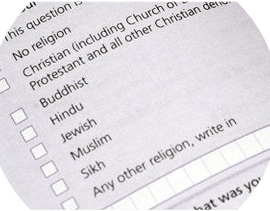


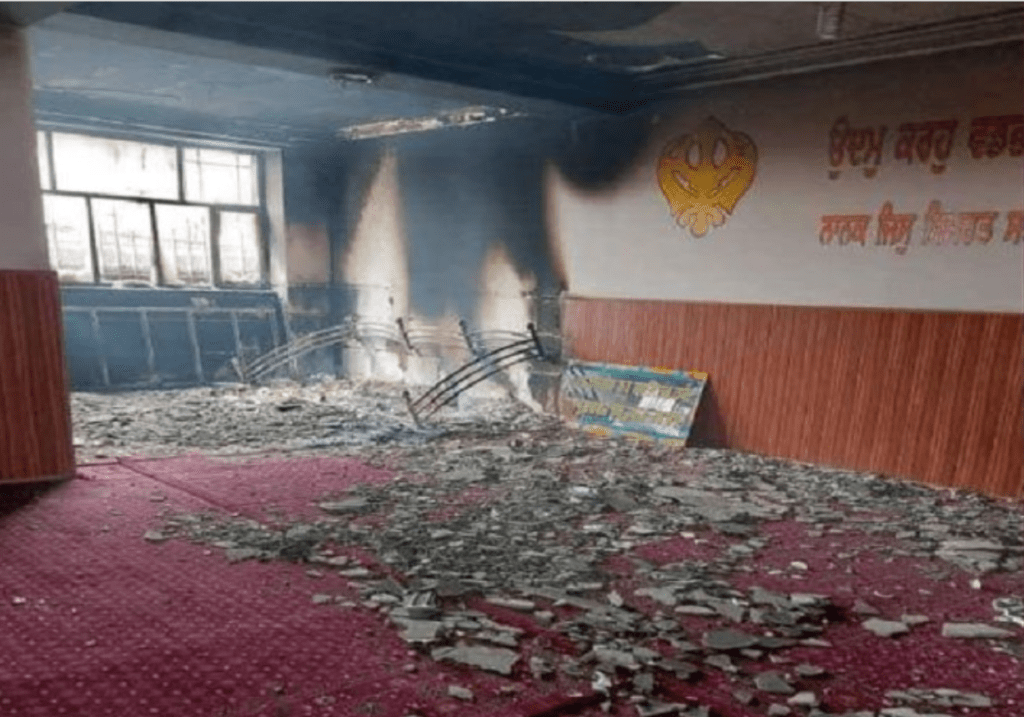
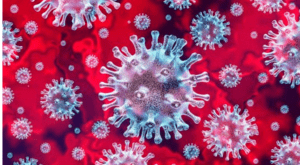 Why we should seriously consider the temporary closing of normal gatherings in gurdwaras to prevent the spread of coronavirus (Covid-19)
Why we should seriously consider the temporary closing of normal gatherings in gurdwaras to prevent the spread of coronavirus (Covid-19)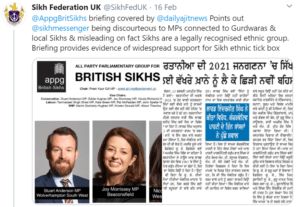 It is no secret our relationship with the Sikh Federation UK (SFUK) has been difficult over the years, especially considering our opposition to their ‘ethnic’ tick box campaign. The SFUK has previously described our Director as ‘an 85-year old dinosaur’,
It is no secret our relationship with the Sikh Federation UK (SFUK) has been difficult over the years, especially considering our opposition to their ‘ethnic’ tick box campaign. The SFUK has previously described our Director as ‘an 85-year old dinosaur’,